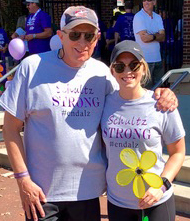.jpg) Younger family members also feel the pain of Alzheimer’s
Younger family members also feel the pain of Alzheimer’s
At age 25, Katherine Schultz didn’t expect to be moving from her new home in Dallas back to her parents’ house in Columbus, Ohio. She was a rising star in the consulting world and enjoying her independence. Then again, she never expected her 62-year-old father, Rick, to be diagnosed with Alzheimer’s disease.
Alzheimer’s was never in the Schultz family’s vocabulary. No family history of the disease. Rick, who worked in sales, and his wife, Helen, a flight attendant, were already looking forward to retiring in North Carolina. And then life dealt them a surprise.
The first signs around age 60 were subtle. Typically outgoing and chatty, Rick gradually became more withdrawn and forgetful. Routine tasks could be more challenging. And to his family, he seemed less attentive. Getting a diagnosis took about two years. Doctors weren’t looking for Alzheimer’s in a man that young.
Everyone adjusts
Fast-forward seven years and the Schultz family has adjusted and adapted as much as a family can to a younger-onset Alzheimer’s diagnosis. Stoic Helen is still carrying the brunt of the caregiving weight, supplemented by in-home professional caregivers on the days she works. And after returning to live with her parents for three years, Katherine has relocated to Denver where she continues on the professional fast track, serving as a deal execution manager for Accenture.
Rick continues to cope with the disease. He reluctantly gave up driving two years ago, and is finally accepting the fact that the professional caregivers will be around when his wife is working. And his Alzheimer’s continues to progress. Working the TV remote is a thing of the past. Dog walks are supervised. But he still enjoys cutting the grass, even if his technique has evolved to seem more like vacuuming.
“He gets the job done,” Katherine noted.
Katherine’s evolution
An Alzheimer’s diagnosis touches every member of the family, each individually. For Katherine, she has discovered a new passion.
“I do not want my children to have to take care of me…to find themselves in the position I’m in,” she said.
So, Katherine has immersed herself in the Alzheimer’s cause, volunteering to educate as many people as possible, supporting research to better diagnose and ultimately find a cure, and helping people understand that everyone affected by the disease is not a senior citizen. Now settled in Denver, she is bringing the same energy she brought to Alzheimer’s Association chapters in Ohio and Texas where she led community education classes, lobbied legislators and raised funds to find a treatment or cure.
“We need to put a younger face on this disease and correct some of the misconceptions,” she said. “People need to understand how it affects entire families. It’s so much more than forgetting your name. You forget how to chew and swallow.”
The importance of caregiving

An important lesson Katherine came away with from her time living with her parents was the value of caregiving and giving the primary caregiver – in this case her mother – some respite from the 24-hour-a-day responsibility.
“I am sure she has her moments,” Katherine said of her mother, “but it’s rare that she shows defeat. It’s hard for one caregiver to do it all.”
For that reason, Katherine encourages family and friends of those living with an Alzheimer’s diagnosis to not be shy. Offer to do a chore or cook a dinner or just visit. It makes a difference.
While moving back to Columbus for three years to help provide care for her dad was a major lifestyle change for Katherine, it’s a choice she’d make again in a heartbeat.
“I had no (personal) life for those three years,” she said, “but I had the chance to create some new memories with my dad. I don’t know if he’ll ever get the chance to walk me down the aisle or see my children. I wanted to be there.”
Alzheimer's Association
The Alzheimer's Association leads the way to end Alzheimer's and all other dementia — by accelerating global research, driving risk reduction and early detection, and maximizing quality care and support. Our vision is a world without Alzheimer's and all other dementia.™ For more information, visit www.alz.org or call the 24/7 Helpline at 800.272.3900.